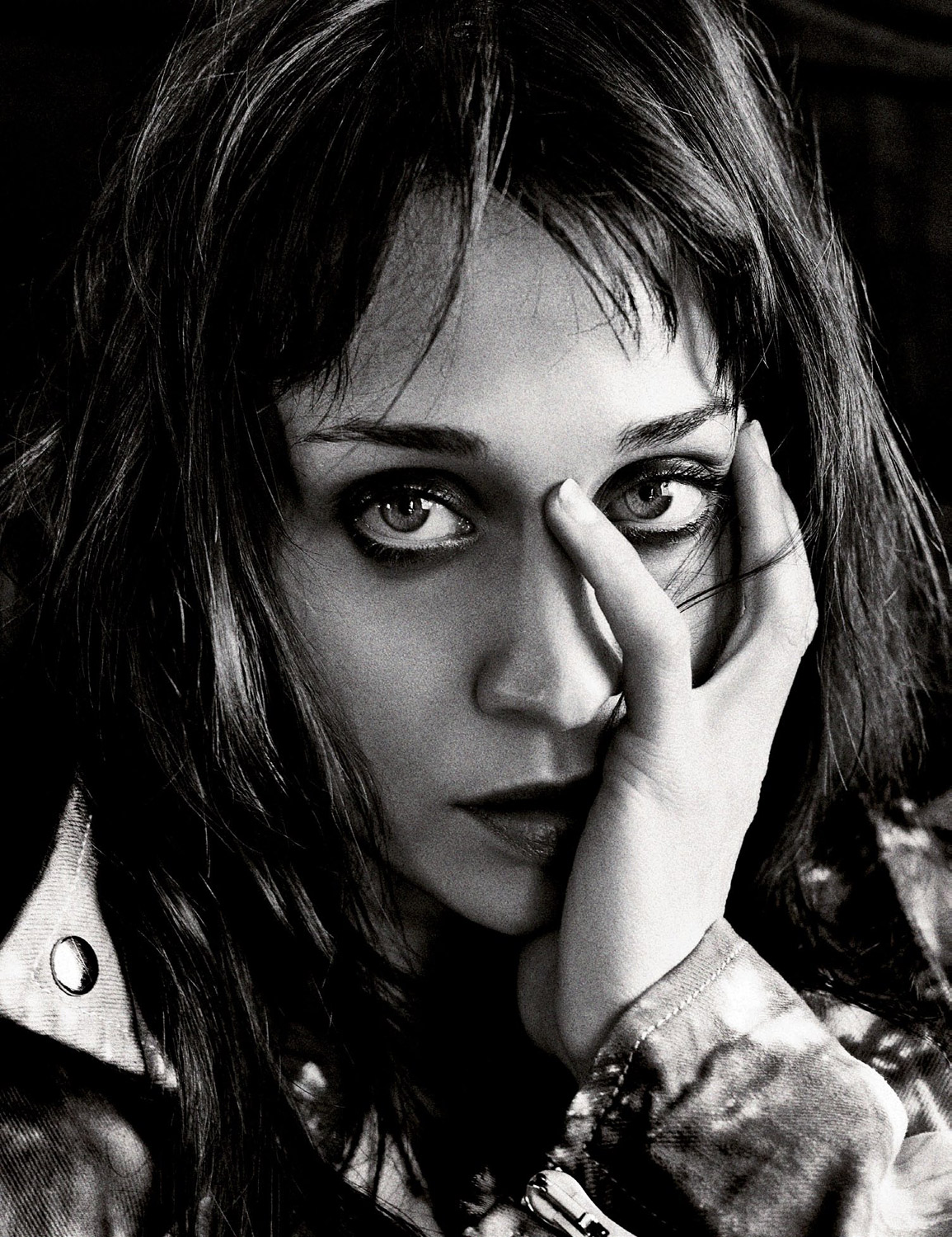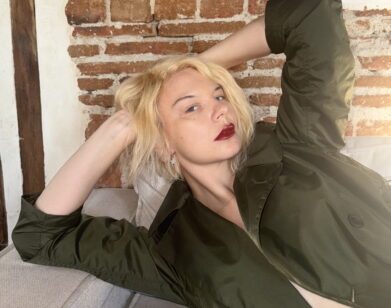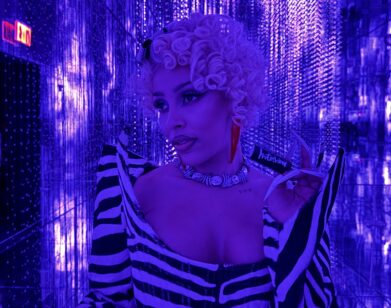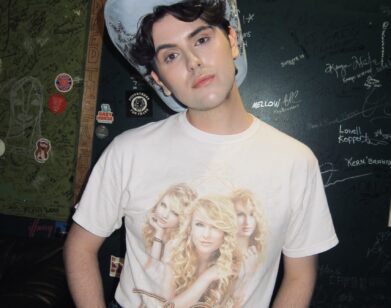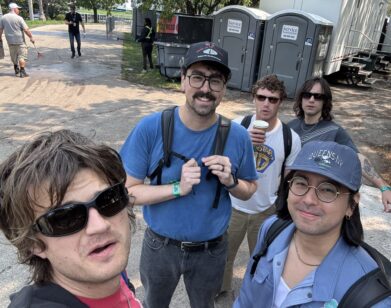Fiona Apple
Fiona Apple’s new album is called The Idler Wheel is Wiser Than the Driver of the Screw and Whipping Cords Will Serve You More Than Ropes Will Ever Do (Clean Slate/Epic), and while that might very well be the most elaborate title to emerge from the realm of pop music this year, so too is the music contained therein sprawling and expansive. Produced by Apple and multi-instrumentalist Charley Drayton, The Idler Wheel . . . ripples and flows according to Apple’s whim as she embarks on a journey through her various romances and visions, careening from humor to tragedy to poetry within songs and even verses.
Of course, Apple has always been drawn to extremes. She released her debut album, Tidal, in 1996, at the age of 18, her youth belying the artfully jazzy sophistication of her piano work, her hauntingly soulful voice, and her confrontational lyrics. Tidal would go on to sell more than 3 million copies, but not before Apple became ensnared in what would become the first in a complicated web of controversies that have punctuated her career—this one thanks to the voyeuristic Mark Romanek-directed video for “Criminal,” in which she is seen writhing around in her underwear at what appears to be a druggy, sexed-up, late-night party in the tricked-out basement of a kid whose parents are both figuratively and literally out of town. The vague illicitness that seemed to be implied by the entire tableau—as quaint as it might seem now—caused an uproar that permeated every level of the media. At the time, a source no less venerable than The New York Times addressed the video’s impact in two separate articles, saying Apple resembled “a Lolita-ish suburban party girl” in one, while noting in the other that “some critics said [the video] was nearly pornographic.” While receiving Best New Artist honors at the 1997 MTV Video Music Awards, she delivered what is surely one of the most memorable acceptance speeches of all time. (Search on YouTube for “Fiona Apple” and “This world is bullshit.”) And while the full title of The Idler Wheel . . . is long, it is in fact the second-longest title in Apple’s discography, ranking behind the 90-word lyrical banner of her sophomore album (google it), which is commonly referred to as When The Pawn . . . and, after its release in 1999, entered Guinness World Records as having the longest title for an album by anyone ever. Even Apple’s last album, Extraordinary Machine, was not without its own sideshow story: The record, which was ultimately released in 2005, was originally completed in its initial incarnation with producer Jon Brion in 2003, but Apple was reportedly unsatisfied with the results and set out to rework some of the songs with producers Mike Elizondo and Brian Kehew. Nevertheless, the delay in its release—and subsequent leak online of some of the Brion-produced tracks—sparked a rumor that it had been rejected by Apple’s label, Epic, inspiring a grassroots “Free Fiona” campaign that drove her more vociferous fans to mail foam apples to executives at Sony BMG, Epic’s parent company.
Despite Extraordinary Machine‘s rocky road into being, the album proved a commercial and critical success, though it would take Apple seven more years to release The Idler Wheel . . . . But if anything, interest in Apple has only seemed to grow in the time between records. Now 34, she is, in many ways, an open book, though depending what page you open to, that book can seem like a confessional diary, a biting satire, or an imagistic fable—sometimes all at once. We spoke recently in Los Angeles.
MATT DIEHL: I recently saw a clip of you being interviewed by Jimmy Kimmel, and you said something so funny and telling: “My mind goes to tragedy first.”
FIONA APPLE: I think everybody’s mind does. That’s why we’re here—why humans have survived. Our ancestors always thought of the worst thing that could happen, and that’s why we’re alive.
DIEHL: So you’re prepared for the worst.
APPLE: Yes, but I also always start with tragedy because if somebody’s going to hurt me, then I want to have gotten there first.
DIEHL: “I’m going to hurt myself first, because I know the punch is coming.”
APPLE: Yeah . . . [laughs] There sort of has to be a problem in order to get anywhere. You know, I’ve always thought that it would be really funny if somebody made a romantic comedy where absolutely everything went well from beginning to end. Every time you thought, “Oh, this is the part where things are going to go wrong,” everything would just go great. That would be a novelty. But most of the time you need something to fight against. If something is bothering me, then the only way to get past it is to work through it. I might have actually done the worst thing possible by writing all these songs, because I have to sing them forever, and yell at somebody when I’m not mad at them anymore. Sometimes I’ve even come around to being on their side, but I still have to sing a song about the whole thing. I’m going to have to spend the rest of my life being angry at ex-boyfriends or whatever . . . Yeah, I was a brat, man. [laughs] But it’s okay. When I’ve been doing shows lately, it’s like I’ve been snapped up into a movie or something. I don’t have to try to feel the stuff because I can apply a song from 15 years ago to something that’s going on now—which is sometimes a very big warning sign that something is wrong. [laughs] But after a while, the songs kind of become somebody else’s poems that you can put your own meaning in.
DIEHL: I’ve heard you say that your songs always start with a phrase. Was there a phrase that launched the creative process for The Idler Wheel . . . ?
APPLE: Hmm . . . I think the first phrase that I wrote off of for this album was at the beginning of the song “Left Alone.” I wanted to use the phrase “moribund slut,” which led me to use the phrase “orotund mutt.”
DIEHL: There are some really evocative lyrics on this album. Where does the imagery in the title come from
I don’t go on lunch dates with friends. I hear about people having dinner parties, but I never do that. I’m not really human.Fiona Apple
APPLE: For years now, in many of my notebooks, there would always be something about an idler wheel. I like the idea of the idler wheel—it just sits in between things, but it makes such a big difference in the way that the machine is working. That concept has always been something that has interested me, but I didn’t really know why. Now I feel like it connects with feeling everything because I’ve gone through a lot of attacking things in my life—like, “There’s a problem here, I have to do something about this,” or “I’m not useful unless I’m doing some kind of job.” It’s to the point where I feel like I’m not really a full human. I used to feel like, “I’m not a functional person because I don’t go on lunch dates with friends. I hear about people having dinner parties but I never do that. I’m not really human.” But if I were to imagine myself as an idler wheel inside some big mix of gears, then I would be connected to everything. It’s not like there’s just me and then nothing. This is going to make me sound kind of flaky, but I’m like “Hands Across America” with the moon right now. I feel like I am connected to even the farthest-reaching part of the universe—as is everybody.
DIEHL: And as part of this larger thing, you’re both observing and interacting.
APPLE: Mm-hmm . . . I’m like the driver of the screw.
DIEHL: You mentioned the idea of feeling things, which made me think of that line in the song “Valentine”: “While you were watching someone else / I stared at you and cut myself.”
APPLE: I was a little afraid of putting that line in because I didn’t want to make it sound cool, because I don’t cut myself . . . I used to be somebody that would cut themselves, and it is about wanting to feel something. But something that I do . . . I mean, this is totally from an actual situation of me watching someone watching someone else being really alive—not quite in the way it seems in the song—but after a while I realize that I’ve dug holes in my palm with my fingernails. I just tend to do things to myself that I don’t realize I’m doing. Sometimes I bite my lip so that it splits and hurts, and yet I can’t stop. And sometimes I’d play shows on the last run, I’d scratch my neck while I was singing, and I’d horrified to see these red streaks of blood after. I’d go back after meet-and-greets, and I would look in the mirror and be horrified because there would be, like, just streaks, like I’d gone like this. [mimes scratching her neck]
DIEHL: I think I’ve actually seen you do that while you were performing.
APPLE: Yeah, I mean, there was a lot of . . . There was a lot of pain going on there, so I think I was really abusing myself. I didn’t realize that I was doing it, but I think it was coming from a painful place, and it was very embarrassing when I would go backstage after a meet-and-greet and realize that no one told me that I had, like, these red stripes down my neck. It was like, [in jokey voice] “I wonder why they all think I’m so sad?” [laughs]
DIEHL: I understand why there were six years between When the Pawn . . . and Extraordinary Machine, but now it’s been almost seven years since that record came out. Why such a gap between albums?
APPLE: I really don’t like making a thing out of, you know, “I’m going to write songs now.” [laughs] That’s why it takes so long.
DIEHL: I figured that you were just lazy.
APPLE: It kind of is . . . I’m not lazy, but I don’t have that spur on my ass that most people have, like, “Oh, god. I have to get something out or else my career will be over!” I don’t really care if my career is over.
DIEHL: Well, when you experience the kind of success that you did so early, people kind of wonder if you can—or will—follow a certain path.
APPLE: I get that, yeah, but, you know, I have no idea if this album sounds different, or doesn’t fit with the ones from before. I don’t have any idea of how either I am really perceived or the music that I make is really perceived. I color it all with my own perception anyway.
DIEHL: There is that line in “Every Single Night” where you actually say, “I just want to feel everything.”
APPLE: Yes. It connects to the name of the record, which I have no idea if anybody can make sense of. I don’t know if it would make any sense to me.
DIEHL: Well, you say you want to feel something, and then you mention “whipping cords” in the title . . .
APPLE: That relates to me having a problem with the whole “do unto others” thing, and also to the “ounce of prevention is worth a pound of cure” concept. I don’t plan on having kids, but I somehow tend to read a lot about parenting and think a lot about parenting—
DIEHL: You don’t plan on having kids?
APPLE: No, I’ve never wanted kids. But I do read about parenting a lot. For some reason it’s very interesting to me-I think because I’m just big on self-parenting. But I read this thing in a nautical book about how when ropes get frayed you’d use the whipping cords to fix the ends. The whole thing of the whipping cords is that, if I did have kids, I could either teach them how to stay out of trouble—or how to get out of trouble, which I think is more important. Because no matter how well prepared you are in life, you’re gonna fall down a hole, and if you can fix the frayed ends of things, then you’re better off.
DIEHL: It might be weird to say this after all this talk about pain and viscera, but as a person you’re really funny. Do you think that’s something that hasn’t fully come through?
APPLE: I’m actually very goofy. I hate this feeling like I’m name-dropping, but Paul Thomas Anderson [the director and Apple’s ex-boyfriend] told me that two of the funniest people he knows are me and Daniel Day-Lewis. He was like, “You’re both hilarious, but everybody thinks you’re awful.”
DIEHL: Is The Idler Wheel . . . a relationship album? Or a break-up album? Or a coping album? Strangely, I can’t tell.
APPLE: There’s this song “Werewolf,” which is important for me. I realized I was trying to be friends with somebody who I used to be with but who I didn’t get along with. I’m really big on that. I need to be friends with everyone that I’ve ever had a relationship with.
DIEHL: You even have a song titled “Jonathan,” which I’m assuming is named for another ex-boyfriend, the writer Jonathan Ames.
APPLE: Well, we’ve been broken up for almost two years, and he has another girlfriend. That’s why I feel really bad when I’m talking about people. I feel like there are women out there like, “Stop talking about my fucking boyfriend!” Maya Rudolph [Anderson’s current partner] is gonna be like, “What the fuck? Can you just leave? Can you not be around anymore?” Insane.
DIEHL: Well, you did call that song “Jonathan.” You put it out there.
APPLE: I did that because Jonathan likes his name to be spoken. He pisses me off in so many ways, but I’m still very close with him. I felt like he deserves to have a song with his name in it. I was staying in an apartment in New York and he was just starting up his show [the HBO series Bored to Death]. I was writing this instrumental thing that I’d started after he had taken me to Coney Island—he takes all of his girlfriends to Coney Island. I was bitchy about it later on, but at the time he gave me this really wonderful day of simple joy and kindness. But after we broke up, I was like, “Am I gonna put this song on the album?” You know, this is going to sound awful, but it’s also about practicality. If I ever get a boyfriend again, do I really need to be explaining for the rest of my life why they don’t have a song but Jonathan does?
DIEHL: At this point, any boyfriend should assume that he’s eventually going to be fodder for a song.
APPLE: At least now they know I’m not just completely blaming the other person. “Werewolf” was really an important song for me because it was admitting, “Yeah, all the anger that I had toward you was justified, and you are an asshole, but I was a great dance partner, and I brought a lot of that out of you.”
DIEHL: So you’ve gone through some stuff in the seven years between albums.
APPLE: [laughs] I’ve had the most significant growth and craziness happening. I mean, the Jonathan relationship had so many different phases. We were long-distance and everything, so it was, like, a year before I would allow us to be called boyfriend and girlfriend.
DIEHL: Why?
APPLE: Because I was all about, “I will never have a boyfriend again.” But I have to say that there have been a few other relationships in that time, too.
DIEHL: That are reflected on this album?
APPLE: Well, a couple.
DIEHL: I’ve always liked that you leave a lot of time between records. Your fans react so passionately whenever new music finally appears.
APPLE: That’s become the only reason that I do this now—that I found out that somebody wanted me to be here. I don’t need to write songs anymore. I can find other ways of expressing myself. But the “Free Fiona” thing in particular made me feel like I had actually gotten my wish from when I was 17 and got signed. At the time, I very honestly, sweetly, naively thought that I was going to make a record that would make all my friends come out of the world—and “Free Fiona” really made me feel like they did. I had lots of experience with people telling me that they didn’t want to be friends with me because I was too sad, which is just the worst thing. [both laugh] But now I’m not sad anymore, and that really made me feel like my friends did come out. I recently met the guy who started that “Free Fiona” thing in Chicago, and he apologized and said, “We know that it wasn’t what we thought it was. We thought it was Sony.” I had to physically stop myself from getting down on my knees and grabbing his foot. For some reason I wanted to grab his foot and cuddle his shoe or something.
DIEHL: Cuddle it?
APPLE: Yeah, in the middle of this alley. That would be very strange, so I put my arm around him instead. But that whole thing really made me understand why I do this-that someone actually wanted me to be here. That’s what has sunk in now that I’m not completely selfish about it all. It used to be that I was really just doing this for myself to get through stuff, and I don’t think I really appreciated what it meant to have other people find something in it for themselves, but now it’s really rewarding to me.
DIEHL: When you were younger, were you surprised at all by the way that people reacted to you? For example, how did you feel about the response to “Criminal” video when it first came out? Were you prepared for the backlash?
APPLE: I understand why that backlash happened—and I also understood it at the time. I think people could tell that I wasn’t comfortable. A lot of that happened because Janeane Garofalo made a big deal out of it, which I actually heard from one of my comedian friends, Margaret Cho. Actually, I do like namedropping. [laughs] But Margaret told me that Janeane Garofalo had a letter that I wrote to her and had it on her wall to remind her that she could hurt people. I don’t even remember writing her a letter.
DIEHL: What about your “This world is bullshit!” speech at the MTV Video Music Awards? Did the response to that surprise you?
APPLE: The MTV thing . . . I was not comfortable in that situation, but that was my top moment of self-parenting. No matter if I didn’t say it completely right, I said what I wanted to say. That was going from junior high to another junior high. I felt like, “If I can say what’s on my mind now, then that’ll be the kind of person that I am.”
DIEHL: At the time, though, both of those situations seemed like convenient things for the media to obsess about.
APPLE: Oh, that’s all it is. There’s never any content. They’re so annoyed by me, but when you ask them why, you know . . .
DIEHL: I guess the person now who has most recently been the recipient of that kind of media scrutiny is Lana Del Rey.
APPLE: Yeah. I feel so bad for her.
DIEHL: Why do you feel bad for her?
APPLE: I just feel bad for anybody who gets trashed. I haven’t heard any of her stuff really, but I saw that first Saturday Night Live performance, and I didn’t think that there was anything about that performance that deserved to be trashed. If you gave me a whole movie’s worth of all the performances on Saturday Night Live with all of the people that they’ve had on there, she’d be way down on the list of people that I would trash. I don’t remember the song that I saw her sing, but that’s all I’ve seen of her.
DIEHL: So are we going to wait another seven years for another album?
APPLE: I don’t know. I’m very lucky that I don’t worry about stuff like that. I don’t have a plan in life. I know basically I want to move back to the East Coast, but I don’t know what I’m going to do. I know I’ve said it every time, but I don’t know if I’m going to make another album. I’m going to do whatever I do, and if I don’t do this and can’t find something else and lose all of my money and become broke, then I’m going to have some hard times. There will be new people that I’ll meet, and I’m to be excited about that. I know that I’ll be having new experiences and traveling to places.
Matt Diehl is a contributing music editor for Interview.
Click here to listen to the first track of the new album.

